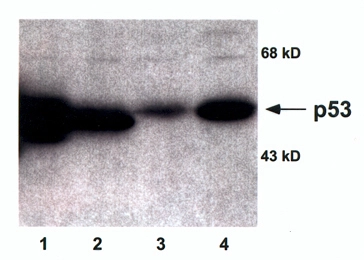p53 antibody [DO-11]
GTX75258
ApplicationsImmunoPrecipitation, Western Blot, ImmunoHistoChemistry, ImmunoHistoChemistry Frozen, ImmunoHistoChemistry Paraffin
Product group Antibodies
TargetTP53
Overview
- SupplierGeneTex
- Product Namep53 antibody [DO-11]
- Delivery Days Customer9
- Application Supplier NoteWB: 1/1,000. IHC-P: 1/1,000. *Optimal dilutions/concentrations should be determined by the researcher.Not tested in other applications.
- ApplicationsImmunoPrecipitation, Western Blot, ImmunoHistoChemistry, ImmunoHistoChemistry Frozen, ImmunoHistoChemistry Paraffin
- CertificationResearch Use Only
- ClonalityMonoclonal
- Clone IDDO-11
- Concentration1 mg/ml
- ConjugateUnconjugated
- Gene ID7157
- Target nameTP53
- Target descriptiontumor protein p53
- Target synonymsBCC7, BMFS5, LFS1, P53, TRP53, cellular tumor antigen p53, antigen NY-CO-13, mutant tumor protein 53, phosphoprotein p53, transformation-related protein 53, tumor protein 53, tumor supressor p53
- HostMouse
- IsotypeIgG1
- Protein IDP04637
- Protein NameCellular tumor antigen p53
- Scientific DescriptionThis gene encodes a tumor suppressor protein containing transcriptional activation, DNA binding, and oligomerization domains. The encoded protein responds to diverse cellular stresses to regulate expression of target genes, thereby inducing cell cycle arrest, apoptosis, senescence, DNA repair, or changes in metabolism. Mutations in this gene are associated with a variety of human cancers, including hereditary cancers such as Li-Fraumeni syndrome. Alternative splicing of this gene and the use of alternate promoters result in multiple transcript variants and isoforms. Additional isoforms have also been shown to result from the use of alternate translation initiation codons from identical transcript variants (PMIDs: 12032546, 20937277). [provided by RefSeq, Dec 2016]
- Storage Instruction-20°C or -80°C,2°C to 8°C
- UNSPSC12352203
References
- p53 isoforms differentially impact on the POLiota dependent DNA damage tolerance pathway. Guo Y et al., 2021 Oct 13, Cell Death DisRead more
- A functional interplay between delta133p53 and deltaNp63 in promoting glycolytic metabolism to fuel cancer cell proliferation. Gong L et al., 2018 Apr, OncogeneRead more



![IHC-P analysis of human colon carcinoma tissue using GTX17698 p53 antibody [TP53/2092R].](https://www.genetex.com/upload/website/prouct_img/normal/GTX17698/GTX17698_20200115_IHC-P_496_w_23060620_160.webp)
![IHC-P analysis of human breast carcinoma tissue using GTX17818 p53 antibody [rTP53/1739].](https://www.genetex.com/upload/website/prouct_img/normal/GTX17818/GTX17818_20200115_IHC-P_387_w_23060620_474.webp)
![IHC-P analysis of human colon carcinoma tissue using GTX18091 p53 antibody [PCRP-TP53-1F7].](https://www.genetex.com/upload/website/prouct_img/normal/GTX18091/GTX18091_20200115_IHC-P_490_w_23060620_250.webp)